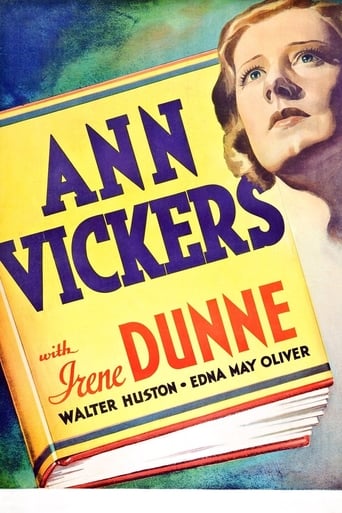utgard14
Lackluster romantic drama with feminist elements. Basically it's Irene Dunne spouting off about wanting to have her own career and being involved in relationships with douchebags. All of the success she has career wise is ultimately attributed to a man and the film's message seems to be that a woman's happiness only comes from the love of a man, so I really don't see where feminists are supposed to find much to love about this film. The brief middle part of the film dealing with the brutal goings-on at a women's prison are most interesting. They should've made an entire film of that. The rest is forgettable. The cast is fine. No standouts. Edna May Oliver is wasted, which is just criminal.
samhill5215
This film starts out wonderfully. The protagonist, Ann Vickers, is an independent woman, a suffragette pursuing a career, a woman who knows her mind and is determined to lead a life without a man's stamp of approval. She even has two illegitimate children. For 1934 this was definitely forward thinking, even dangerously revolutionary. And so the first half of the film goes on this vein with Ann being refreshingly modern. I suspect that many women viewers identified with her dreams and struggles.And then the story grinds to a halt and Ann's life comes apart, and all because her lover, a corrupt judge, is convicted and sent to jail. When she is forced to abandon her career it is made eminently clear that she owed her success to her once influential lover. All her hard work amounted to nothing once her powerful protector disappeared. Moreover, she betrays her own ethical standards by pleading for her lover's freedom. So the implication is that love is the paramount motivating factor in a woman, and Ann is reduced to a stereotype. She even waits for her man to get out of jail and learns to cook for him.Frankly I felt betrayed. I became involved in this woman's life and cheered her on only to discover that Hollywood lacked the courage to present a truly alternative lifestyle. I guess I shouldn't have been surprised. After all 1934 was the year the dreaded morality code went into effect. Still, "Ann Vickers" would have been a much better film if they had left well enough alone.
jaykay-10
It is doubtful if, at this point in time, anyone needs to be reminded of the consistent excellence of the versatile Irene Dunne, whose presence enhanced drama, comedy and musical films for many years. ANN VICKERS recalls to us how effective her subtle talent was even early in her career, playing a character alternately strong and vulnerable in a story too crowded with incident to give its major players the room they require to draw the characters fully. As a capable and resolute professional woman involved in social work and prison reform, Dunne's title character is curiously susceptible to the less-than-worthy men she finds more appealing than the steady earthbound types she encounters but does not favor. This contradictions accounts for a large part of the interest in her character, discreetly but firmly abetted by the nuances of yet another outstanding performance. Irene Dunne is perhaps the most reliable of all leading ladies. If you share the admiration of many for her work, this somewhat obscure picture will not disappoint you.
John Seal
To call Ann Vickers a women's picture may technically be accurate--it was, indeed, adapted by Jane Murfin, also responsible for 1939's The Women--but it's much more than that. Quite simply, this is one of the best dramas ever produced in Hollywood. Written with delicacy and tenderness, yet planted firmly in the cruel realities of life, Ann Vickers includes a tour de force performance by Irene Dunne, ably supported by the wonderful Walter Huston as her lover, and Conrad Nagel and Bruce Cabot as would be paramours. There are some incredibly powerful moments here, especially during the prison scenes, and Dunne and Huston are magical whenever they're on screen together. Certainly daring by the standards of the time, Ann Vickers is a refreshingly honest and still topical masterpiece.


